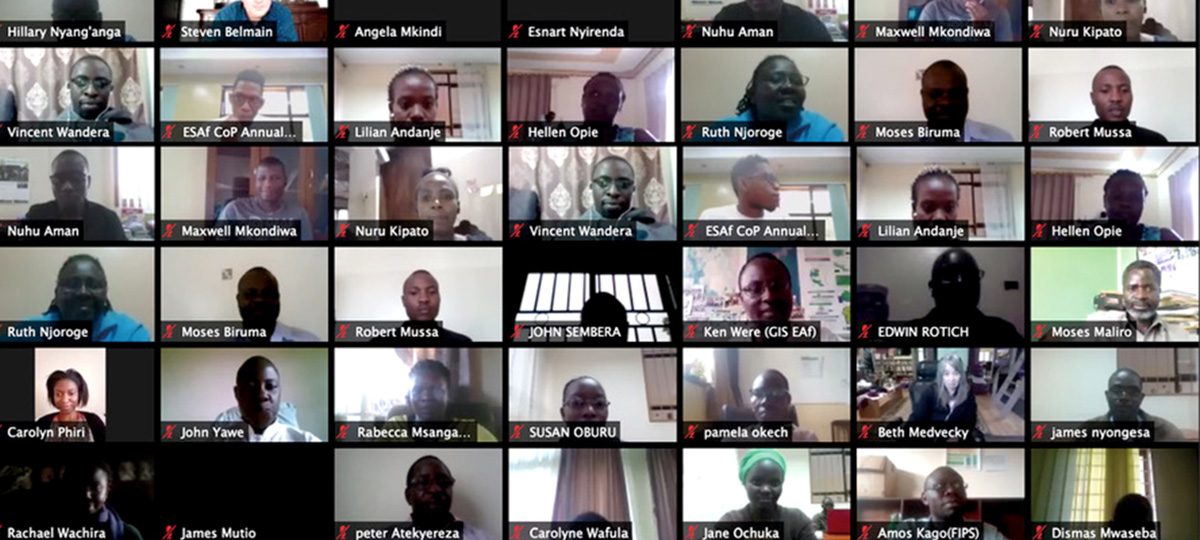
Second Annual East and Southern Africa CoP Meeting Brought Teams Together Virtually
Published on:
November 17, 2020
Community of Practice:
The second annual East & Southern Africa CoP meeting was held online late September. It brought together project teams from Kenya, Malawi, Tanzania, and Uganda; McKnight and CCRP leadership; regional teams from the three regions; cross-cutting CCRP projects; FRN farmers; and guests from international organizations that support agroecology.
The overall theme of the meeting was building the CoP as a vehicle for agroecological transformation in east and southern Africa. Specifically, it aimed to:
- Build thinking and action on creation of knowledge to support AE transitions.
- Strengthen FRN engagement in the CoP for putting AEI into practice.
- Build thinking and action to influence research and uptake of AEI.
- Understand the role of the CoP and agroecology in responding to regional emergencies, including COVID-19, fall armyworm, and climate change.
Thirteen sessions took place during the week, with each drawing 70 to 100 participants. A poster board featured 99 videos, posters, and slides by CoP members.
In the opening session, Jane Maland Cady and Rebecca Nelson highlighted CCRP global-local linkages; Ruth Richardson and Lauren Baker from the Global Alliance for the Future of Food shared actions for the 2021 UN Food Systems Summit; and Kara Carlisle, vice president of programs at the McKnight Foundation, discussed diversity, equity, and inclusion.
Fourteen MSc and PhD students gave ten-minute highlights from their research projects during the student presentations session, fielding participant questions and comments. A follow-up discussion identified mentoring, virtual training, and exchange programs as practical steps to support students.
A new ESAf CoP theory of change for inclusive, sustainable development in the region was presented and reviewed. Three pathways for agroecological transformation (AEI) were broadly agreed upon: generating global and local knowledge (research); demonstrating integrated agroecological approaches (practice); and shifting awareness, understanding, attitudes, and engagement to AEI (policy).
The Agroecology Support project introduced agroecology transitions and transformations, including social aspects of transitions by Rachel Bezner Kerr with an exercise on AE transition mapping by the Drylands FRN project. In the policy processes and AEI session, Malawi hub grantees Daimon Kambewa and Richard Lamboll facilitated an exchange of ideas and experiences on engaging policymakers and other stakeholders in each of the four CoP countries and ideas for future engagement.
The FRN session focused on enhancing engagement between farmers and other CoP members, with a video and panel discussions from Botanicals, FRN-NGO, FRN Uganda, and Best Bets projects creating a virtual field trip. Presentations by Kate Wellard, Frank Tchuwa, and Mary Richardson highlighted FRN learning, successes and challenges, and opportunities for further engagement through the CCRP’s FRN working groups.
The three CCRP hubs—AE Tanzania, Malawi AEI, and Manor House Kenya—and the FAO AE Knowledge Hub made presentations and exchanged experiences during the Agroecology Hub session. Small groups discussed policy, knowledge sharing, capacity building and training, and plans for increasing collaboration among the hubs.
Sessions on agroecological pest and disease management, soil health, and circular and solidarity economy included presentations, discussions, and updates on working group activities.
The meeting closed with next steps from each of the sessions; awards for student presentations; meeting evaluation; closing remarks from Daimon Kambewa on behalf of grantees, Prudence Kaijage for the regional team, Jane Maland Cady, and Rebecca Nelson; and a Zoom group photo.